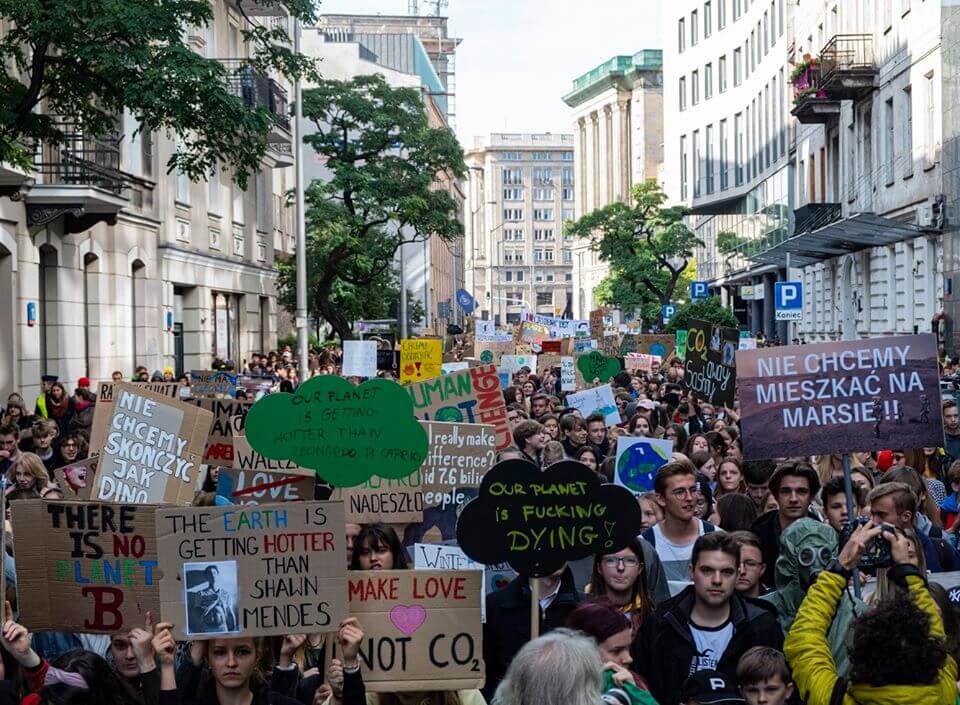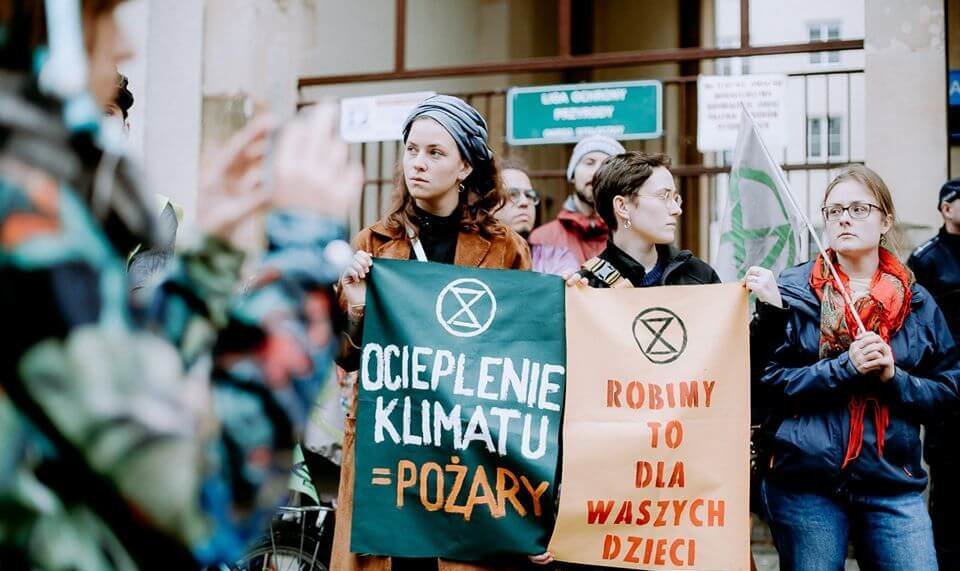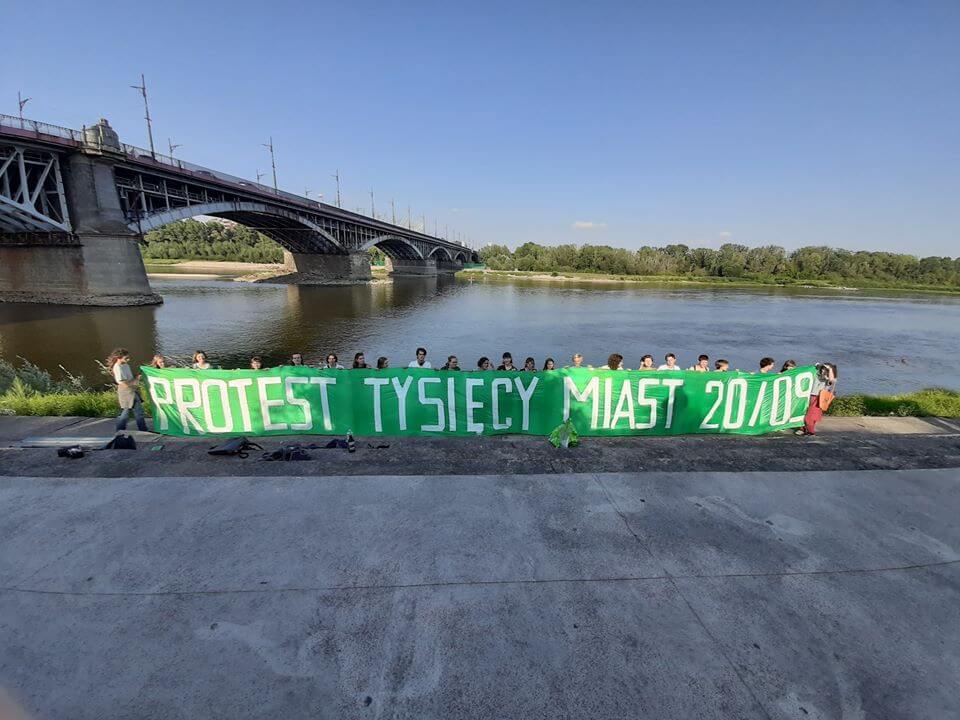In the summer, Poland’s countryside is covered in beautiful pastels and the sun glints off marshy rivers that criss-cross the landscape. But for the 60 percent of Poles who live in urban areas, the summer means the return of stifling heat waves and a clear reminder that their homes remain year-round under a suffocating blanket of smog.
Polish air is incredibly polluted. In Warsaw, the capital, drivers can look up and see a thick, cloudy haze grow in size as they enter the city through one of its many highways. And as bad as it is in the summer, Poland’s smog problem really hits its stride during the country’s cold winter. In areas where smog is particularly bad, like the historic city of Krakow in Southern Poland, people joke that the air is so dense you can bite it. In total, Poland is home to 33 of the 50 most polluted cities in Europe despite having only 5 percent of the continent’s population.
While Poland has always had an environmentalist movement, these groups have traditionally been small and possessed relatively little power compared to other NGOs, Urszula Zielińska, a recently elected Green Party member of the Polish Parliament, points out. But in recent years, the state of Polish climate activism has completely and rapidly changed. New groups like Extinction Rebellion Poland and the Youth Climate Strike have exploded onto the Polish political scene, shocking those in power — and even veteran eco-activists — with their ability to organize large, popular mobilizations.

And yet, at the same time Polish climate activists, environmentalist NGOs, scientists find themselves on the crest of a wave of public concern around the environment, Poland’s conservative government continues to frustrate moves towards decarbonization — setting up a political fight over Poland’s environmental and economic future.
“[The government] is changing literally nothing. [Their proposed environmental policies are] just like moving chairs on the sinking Titanic,” Zielińska explains. “Literally, that’s how their policies will look when implemented.”
Poland’s environment has long been in crisis. The European Environment Agency estimated that around 45,000 Poles died prematurely from air pollution-related complications in 2015. In 2019, the Polish Supreme Audit Office issued a report titled, “Poland, European Desert” which warned that the country’s available water resources were comparable to Egypt’s. Deforestation and logging have even created a man-made desert — the Błędów — that can no longer support large amounts of plant life due to the water table dropping precipitously since the Middle Ages. Climate change has simply exacerbated these problems — such as droughts which are increasingly common and severe in Poland.
Critics argue that past and present governments have done little to address the growing ecological problems the country faces. But for many environmentalists, the current Law and Justice party government has pursued policies that actively make fighting climate change harder. These include pushing to open more coal mines in Silesia, logging in the Białowieża Forest — Europe’s last virgin forest — and strict regulations around land-based wind farms that some analysts have said are aimed at slowing the growth of renewable energy in order to maintain the party’s support among miners and the fossil fuel industry. In addition to current policies, the Law and Justice party has proposed several large infrastructure projects that environmentalists say will be extremely detrimental to the environment. One project — a canal through the narrow Vistula Spit — has raised concerns and objections from both the EU and locals who worry that the kilometer-long trench will damage wildlife habitats and hurt tourism.
Taken together, the government’s environmental strategy will have a severely negative impact on the country, opponents warn.
“The long term impact of [government policy] is very clear: it’s over 50,000 premature deaths a year in Poland,” Zielińska says. “Our health system is under huge pressure and this is obviously adding to it, but also economically — The World Health Organization has estimated that just alone due to the lost days of work from those over 50,000 premature deaths, we’re losing about 12% of our gross domestic product as a country per year.”
Yet these statistics have been around for years, while many members of organizations like Extinction Rebellion or the Youth Climate Strike are young and often engaging seriously with environmentalism for the first time. This new generation of environmentalists says it is instead motivated by the growing evidence of the immediacy of climate change.

“I personally started to act in the movement [a month ago], so I’m kind of fresh,” says 29-year-old Przemek Siewior, an activist with Extinction Rebellion Poland. “I was concerned about climate change a lot, but a lot of it was like intellectually and there is a big difference between understanding something with your mind and understanding something with your heart. I know it’s like, sounds very stupid, it’s cliche, but if you really think about climate change, it makes you cry.”
Other activists — like those affiliated with the Youth Climate Strike — are even younger. Ania Pawlowska, 16, has spent much of the past year organizing in Warsaw with other high school students around combating climate change.
“I’m not really proud of it, but I wasn’t entirely aware of the [scope of the] problem until March,” Pawlowska says. “I became aware of the problem after the [Global Climate Strike for Future] on [March] 15th, which is really weird because I kind of went there more because I don’t like plastic and stuff, so things that were not really exactly the aim of the protest. And then I actually educated myself the same day and I was terrified. I remember sitting that evening — it was the 15th of March — I remember that was the day I was born as a climate activist. I was just really frustrated that I didn’t know [about the scale of climate change] before and I felt kind of really weird because I was thinking that [if] this is so big, why is nothing going on and why don’t I know this from school?”
These new activists repeatedly speak about a sense of shock and disappointment with the current environmental situation; many feel betrayed by their governments. This may explain why they tend to be more open to confrontation — by for example using forms of civil disobedience — in order to force change.
“To me personally, it made sense,” says Siewior. “When you look at the climate change discussion and what we are doing as humanity — it is a pretty sad picture. From like the nineties, we are declaring that we will try and reduce our emissions year to year, but they are growing and growing still. So I thought, ‘okay so probably what the governments are doing is not very honest. On the other hand, what the activists are doing is not very effective.’ So yeah, to me it was like this strategy — civil disobedience — could actually work.”
Even outside of these new groups, climate change has become a pressing concern. During the recent October parliamentary elections, 64 percent of Polish voters, said that ‘climate change should be central to the campaign,’. Part of the rise in public attention has come from the growingly obvious effects of climate change in Poland — such as recent escalating food prices as a result of worsening droughts. Food prices have risen 6 percent in Poland, compared to the same time last year, while the European Union as a whole only saw a 2 percent increase. In addition to the financial impacts of climate change, frequent protests have also played an important role in raising public consciousness.
“People are starting to talk about [climate change for a few reasons],” says Pawlowska. “I would say that it’s directly because of young people — I think that it’s like one of the first times that young people in Poland have started organizing themselves and building something together like a movement — and also because of the kind of natural catastrophes going on … we had this huge drought and it cost us like a billion złoty ($260 million) or something. And prices are actually going up and everything is starting to be really expensive.”
According to Eurostat, Poles spend about 23 percent of their monthly income on food and alcoholic drinks compared to the EU average of 16 percent making Poles and the country’s nationalist government sensitive to increases in food prices and raises to the cost of living.
Another contributing factor for the movement’s growth: Greta Thunberg.
“Greta and her mobilization of youngsters really helped in getting the topic to the mainstream,” says Bartłomiej Kozek, a sustainable development specialist in the UNEP/GRID-Warsaw Centre, a long-running environmentalist NGO in Poland. “The amount of articles connected to the climate in the mainstream media in recent months has gone through the roof.”
Since Thunberg spoke at the COP24 UN Climate Conference in Katowice, Poland last December, student climate movements have spread at a break-neck pace around the world, including in Poland where Youth Climate Strike groups now exist in various cities and towns. A year later, in September 2019, close to 6 million people participated in two global climate protests on September 20 and 27 — including multiple marches in Polish cities.
This new wave of climate activism is not, however, a monolith. While there is a general agreement that drastic change needs to happen in order to mitigate climate change, there is a dispute between groups over how to enact such a transformation. Extinction Rebellion and the Youth Climate Strike emphasis direct action such as protests and student strikes, while the newly resurgent Polish Green Party, which recently gained three seats in the country’s parliament, seeks to enact policies through the country’s legislative institutions — although members have said that they are open to working with the more protest-oriented groups.
“I just love the fact that [these activist movements] are growing and I want to also as an MP — they’re very close to my heart as a Green MP — I want to support them as much as I can,” says Zielińska. “I think we’re just about on the verge of a change of political generations in Poland. And I cannot wait until they can vote. And they can also hopefully, hopefully, want to get involved in politics and I’ll be doing everything to convince them to go and change politics from within cause right now they’re completely disgusted by politics and they want to stay away from it.”
Yet, even within the protest groups who advocate for change outside the established political system, there is a diversity of tactics.
“I think that the biggest difference [between the Youth Climate Strike and Extinction Rebellion] is the fact that Extinction Rebellion really hits on civil disobedience,” Pawlowska explains. “To really force change we have to fight in many different ways and although I’m personally not ready for action that could get me in trouble in the face of the law, — mainly because I’m a minor and my parents would probably be held account somehow as well — I do admire what they do. I just believe that I’m more effective as part of a group that uses different tactics.”
While the Youth Climate Strike looks to mobilize young people to pressure their governments to act in accordance with the Intergovernmental Panel on Climate Change’s report and to raise the level of environmental education, Extinction Rebellion argues this is not enough for the current moment.

“Like for example, the youth climate strikes are very good in what they are doing and they are creating a lot of publicity and people are starting to think and talk about [climate change] and that’s great,” says Siewior. “But it just not the level that we are in [right now]. So if we were in the nineties, I would be fine because the knowledge is growing and then in 15 or 20 years you would just start to make good decisions. We, unfortunately, don’t have time to start to educate people. And I hate this. I mean, it’s a very good demand when people say we have to start to educate people about climate change in schools. And I agree completely with it. But on the other hand, it doesn’t make a difference because if you educate a 12-year-old, you still have to wait six years until they can vote for example, and it’s too late.”
Instead, Extinction Rebellion believes disruptive action is needed to highlight the social tension of climate change. Rebellion aligned protesters have blocked roads in Poland and their demands revolve around the creation of an appointed citizen’s assembly that would have the final say over how to implement climate policy — although there is some vaguery if such a body would be given proposal- versus decision-making power.
“I can only speak for myself,” writes Siewior. “There is no line of argument from the whole XR as a movement. There are a few reasons why I think citizens assembly on climate catastrophe should have more deliberative power. The issue we are dealing with is quite complex and the solutions will inevitably transform a lot in our societies. Giving the issue back to the party politics would mean to start the war on the issue all over again. There are political parties deliberately misleading people on the issue of climate change because they reflect special interests. Let for example say that the citizen’s assembly decided to finance the transition [away from fossil fuels] by imposing more taxation on corporations and the rich. Since the media, and a lot of our political life, is in hand of the rich we should expect a big backlash on the proposals from citizens assembly. This, in turn, would once again put our very existence in jeopardy.”
Regardless of their internal disagreements, these campaigns have already made a tangible impact on wider society. Not only has the frequency of climate change discussions risen, but, almost overnight, public attitudes about the imminent danger climate change represents have changed.
“I think [the level of public discussion] is much better now than five or ten years ago,” says Anna Sierpińska, a climate science educator with the environmental education group Nauka o Klimacie (Science about the Climate). “I think that things that Greta Thunberg and young people have done … have changed the way in Poland we talk about climate change. A few years ago, it was like, ‘there is a group of strange people — those Lefties or Greenies or something like that and they are talking about some abstract problem in Poland.’ But [now] many, many people are really concerned and they want to do something.”
Still, the chasm between what the government has enacted and what scientists and activists say is necessary to avoid a climate catastrophe continues to grow. Without a favorable parliamentary majority and elections four years away, Polish environmentalists worry that by now it might be too late to change course.
“There are some scientists that are saying that it’s not possible because even if we stop now today our emissions, the warming will increase to this 1.5 [point],” Sierpińska explained. “I think that we still have a chance. The IPCC said that we have almost a 70% chance to [stay below that threshold] if we do what they are saying: we should start cutting our emissions really fast and change our economic system. [But] at this moment, I think that we are not doing that.”
![Political Critique [DISCONTINUED]](http://politicalcritique.org/wp-content/uploads/2015/09/Political-Critique-LOGO.png)
![Political Critique [DISCONTINUED]](http://politicalcritique.org/wp-content/uploads/2015/09/Political-Critique-LOGO-2.png)